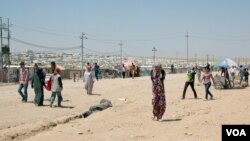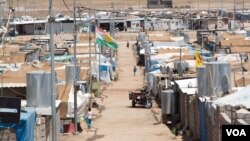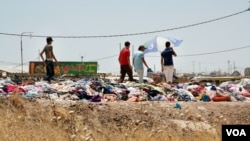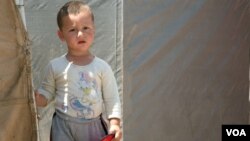DUHOK, IRAQI KURDISTAN —
After years of violence and instability, the Kurdistan region of Iraq has become a safe haven for roughly 150,000 Syrian refugees who have fled civil war in their home country. Kurdish authorities say the influx of asylum seekers is becoming increasingly difficult to manage, and there are fears a humanitarian crisis may ensue unless outside assistance is stepped up.
At the Domiz refugee camp, about 20 kilometers from the city of Duhok, resources are at the breaking point and aid workers say conditions are deteriorating by the day.
Afternoon temperatures in the summer exceed 40 degrees Celsius and water supplies are insufficient.
The site, set up last year to accommodate 25,000 people, is now hosting about twice that number, with many families doubling up in tents. The sewage system cannot cope with the demand; the air is malodorous and dry.
Mohamed Hussein, head of the UNHCR office in Duhok, said congestion is a pressing concern.
"It is a worrying factor for health," he explained. "At the moment, we do not see a disaster or any catastrophe like a cholera outbreak, but when such things take place then the impact will be really terrible. It is just maybe a matter of time."
In addition to those living at Domiz, tens of thousands of Syrians are also residing in Iraqi Kurdistan’s main cities.
A report released last month by the Norwegian Refugee Council suggests some of these urban refugees are living in unsafe buildings and have resorted to begging or prostitution.
"We are doing our best, but we need the help of the international community to reduce the suffering of the refugees," said Hameed Salih, a spokesperson for the Duhok Governorate.
Iraqi Kurdish authorities have repeatedly voiced frustration at the lack of outside support for the displaced Syrians within their territory.
Observers, such as Mohammed Makki, the head of Islamic Relief’s Iraq mission, accuse many global players of overlooking the refugee response in this part of the world.
"I feel there is a lot of support in Jordan and Lebanon and Turkey, but in Iraq it is not the same," Makki said. "Really there is a big difference." Most of the displaced people entering Iraq from Syria are ethnic Kurds.
Despite limited funds, the Kurdistan Regional Government in northern Iraq was quick to allocate $10 million to assist the new arrivals and give them permission to work legally with temporary residence cards.
Ghodar Mohammed Said, who has been living at the Domiz camp for nine months, says despite the difficult conditions, he feels “very welcome.”
But how long this sentiment will last remains unclear.
Some Iraqi Kurds have started to express frustration that foreigners are securing jobs while unemployment among the local population remains relatively high.
With the number of refugees expected to double in northern Iraq by the end of the year, tensions are likely to rise.
Authorities say three new refugee camps are being built, but experts say even these facilities may not be able to cope with rising demand.
Makki, of Islamic Relief, said the problems facing Iraqi Kurdistan and other refugee-hosting areas in the region can be solved only with a solution to end the bloodshed in Syria.
"I encourage the politicians who are in Syria and around the region and around the world to solve this problem and make all the Syrian refugees return back to their country," he said. "Otherwise this issue will affect all the region, especially as the countries around Syria are not very rich countries. Iraq already has a lot of problems."
In May, the border between Iraqi Kurdistan and Syria was closed. Authorities say it will reopen soon and insist the move was not aimed at curbing refugee numbers.
At the Domiz refugee camp, about 20 kilometers from the city of Duhok, resources are at the breaking point and aid workers say conditions are deteriorating by the day.
Afternoon temperatures in the summer exceed 40 degrees Celsius and water supplies are insufficient.
The site, set up last year to accommodate 25,000 people, is now hosting about twice that number, with many families doubling up in tents. The sewage system cannot cope with the demand; the air is malodorous and dry.
Mohamed Hussein, head of the UNHCR office in Duhok, said congestion is a pressing concern.
"It is a worrying factor for health," he explained. "At the moment, we do not see a disaster or any catastrophe like a cholera outbreak, but when such things take place then the impact will be really terrible. It is just maybe a matter of time."
In addition to those living at Domiz, tens of thousands of Syrians are also residing in Iraqi Kurdistan’s main cities.
A report released last month by the Norwegian Refugee Council suggests some of these urban refugees are living in unsafe buildings and have resorted to begging or prostitution.
"We are doing our best, but we need the help of the international community to reduce the suffering of the refugees," said Hameed Salih, a spokesperson for the Duhok Governorate.
Iraqi Kurdish authorities have repeatedly voiced frustration at the lack of outside support for the displaced Syrians within their territory.
Observers, such as Mohammed Makki, the head of Islamic Relief’s Iraq mission, accuse many global players of overlooking the refugee response in this part of the world.
"I feel there is a lot of support in Jordan and Lebanon and Turkey, but in Iraq it is not the same," Makki said. "Really there is a big difference." Most of the displaced people entering Iraq from Syria are ethnic Kurds.
Despite limited funds, the Kurdistan Regional Government in northern Iraq was quick to allocate $10 million to assist the new arrivals and give them permission to work legally with temporary residence cards.
Ghodar Mohammed Said, who has been living at the Domiz camp for nine months, says despite the difficult conditions, he feels “very welcome.”
But how long this sentiment will last remains unclear.
Some Iraqi Kurds have started to express frustration that foreigners are securing jobs while unemployment among the local population remains relatively high.
With the number of refugees expected to double in northern Iraq by the end of the year, tensions are likely to rise.
Authorities say three new refugee camps are being built, but experts say even these facilities may not be able to cope with rising demand.
Makki, of Islamic Relief, said the problems facing Iraqi Kurdistan and other refugee-hosting areas in the region can be solved only with a solution to end the bloodshed in Syria.
"I encourage the politicians who are in Syria and around the region and around the world to solve this problem and make all the Syrian refugees return back to their country," he said. "Otherwise this issue will affect all the region, especially as the countries around Syria are not very rich countries. Iraq already has a lot of problems."
In May, the border between Iraqi Kurdistan and Syria was closed. Authorities say it will reopen soon and insist the move was not aimed at curbing refugee numbers.







